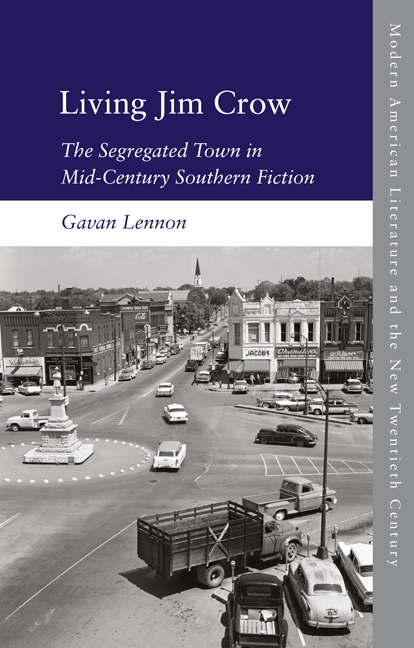Book contents
- Frontmatter
- Contents
- Acknowledgements
- Introduction: Uncovering a Poetics of Protest
- 1 Creators of the Small Town: Anthropology, Racial Etiquette and African American Fiction in the 1930s
- 2 The White Town/Coloured Town Paradigm: Lillian Smith’s Maxwell
- 3 An Anatomy of Critique: Byron Herbert Reece’s Tilden
- 4 The Milan Cycle: Carson McCullers’s Milan
- 5 Breaking the Pencil: William Faulkner’s Jefferson
- 6 Knowing How to Curse: William Melvin Kelley’s Sutton
- Conclusion: (De)Generative Ground – The Field and the Segregated Town
- Notes
- Bibliography
- Index
3 - An Anatomy of Critique: Byron Herbert Reece’s Tilden
Published online by Cambridge University Press: 15 October 2020
- Frontmatter
- Contents
- Acknowledgements
- Introduction: Uncovering a Poetics of Protest
- 1 Creators of the Small Town: Anthropology, Racial Etiquette and African American Fiction in the 1930s
- 2 The White Town/Coloured Town Paradigm: Lillian Smith’s Maxwell
- 3 An Anatomy of Critique: Byron Herbert Reece’s Tilden
- 4 The Milan Cycle: Carson McCullers’s Milan
- 5 Breaking the Pencil: William Faulkner’s Jefferson
- 6 Knowing How to Curse: William Melvin Kelley’s Sutton
- Conclusion: (De)Generative Ground – The Field and the Segregated Town
- Notes
- Bibliography
- Index
Summary
Driving along US Route 19 between the Neels Gap mountain pass and the small north Georgia town of Blairsville, a traveller would pass through a stretch of road that was named the Byron Herbert Reece Memorial Highway in 2005. Reaching Blairsville, the same traveller could visit Reece's home on a nearby farm, a state heritage site, to walk a trail through the beautiful surroundings and purchase Appalachian crafts in the gift shop. Despite this evidence suggesting that the novelist and poet is remembered as an icon of northern Georgia's cultural heritage, Reece's work has had little place in southern literary studies. Literary critics rarely turn to him as a significant southern poet, let alone as a novelist. The abiding image that has so far formed of Reece is that of a rustic mountain bard, whose writing is somehow ‘authentically’ simple. Many of the mistakes made in reading and remembering Reece are parallel to the mistakes made in considering southern Appalachia, and this chapter offers a corrective to each of these misconceptions. The focus of this chapter, Reece's second novel, The Hawk and the Sun (1955), is a complex indictment of racial violence in the life of the fictional town of Tilden, Georgia, on the day in which the white community bands together to lynch the town's last African American resident.
Despite its critical neglect, the novel is a sophisticated anti-racist text that builds on wide and cosmopolitan influences, and is deeply engaged with Reece's contemporary moment. My reading complements and extends a body of scholarship in Appalachian Studies that reads the region as racially and politically diverse as a corrective to marginalising narratives of the mountain South. As literary critic Rodger Cunningham argues, the Appalachian mountain range holds a precarious geographical and ideological position in the United States as it is ‘not only an internal Other to the South as the South is the internal Other of America, but it is also the occupier of a simultaneous gap and overlap between North and South’. By reading Reece's exploration of racial segregation through a typology of the southern town, I argue that he is an author who is both experimental and engaged with contemporary racial politics. Locating Reece in this way contributes to a growing scholarly understanding of southern Appalachia.
- Type
- Chapter
- Information
- Living Jim CrowThe Segregated Town in Mid-Century Southern Fiction, pp. 85 - 122Publisher: Edinburgh University PressPrint publication year: 2020



